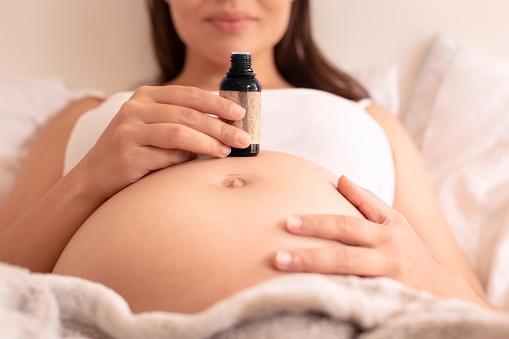Aromatherapy in Pregnancy: Top 6 essential oils to use when pregnant (and unsafe essential oils while pregnant)

There are so many wonderful ways to use herbs during pregnancy. Aromatherapy is one of these ways and is simply defined as the use of essential oils for healing and health. Essential oils are derived from plants and are 40-70 times more concentrated than the plant in its whole form. They contain 100’s of different phyto-chemicals and play a role in defending the plant against bacteria, fungus and viruses. Various parts of a plant are used and the oils are extracted through techniques such as distillation (similar to making alcohol spirits).
When we are stimulated by smell, our central nervous system responds depending on the attachment we have made to that scent bringing up feelings and memories. For example, a certain smell may remind us of a happy time as a child. Every individual perceives scents differently; something that is pleasant to one person may be irritating to another. This is especially true in pregnancy, a certain smell a woman loved prior to becoming pregnant may turn her stomach once pregnant.
There are many ways to use essential oils but as a general rule do not ingest or use internally while you are pregnant. If you are going to apply topically, ensure to avoid eyes and mucus membranes and always do a patch test first with the essential oil diluted in carrier oil such as coconut or almond. Inhaling an essential oil is one of the fastest ways to benefit therapeutically. Simply breathing the essential oil in through the nose can quickly get rid of, or at the very least, decrease the severity of a headache. One of my favourite recommendations is to use a steam inhalation for sinus and chest colds as it’s a great way to clear congestion. Diffusers clean and purify the air but also create a more relaxing space for those with anxiety and stress. When choosing essential oils, the quality of the product is important as there is no formal body regulating companies that produce the oils. Look for labels that state purity and list only the common or botanical names of the herbs and caution with phrases like “perfume oil” or “fragrance oil” as these might be synthetically derived. The better quality oils tend to come with a higher price but consider what it takes to make an essential oil: 2000 kg of rose petals produce 1 kg of rose essential oil!
Below are my top 6 essential oil recommendations that are safe for external use in pregnancy. Remember to always speak with your healthcare provider prior to using any herbal products in your pregnancy.
1. Lavender: best known for improving sleep and promoting relaxation, also great for healing burns (when diluted), alleviates itching and stings from bug bites, and can help decrease muscle tension and nerve pain.
2. Eucalyptus: amazing for clearing chest congestion, headaches (Eucalyptus radiata is the safest form).
3. Ylang-Ylang: promotes relaxation but is also useful for mood swings to reduce irritation associated with hormone fluctuations and is considered an aphrodisiac.
4. Sweet Orange: a potent disinfectant used in many cleaning aids and room purifiers but it can also be used to treat low mood and anxiety (get my for my room spray recipe for treating anxiety naturally and tips to help reduce anxiety naturally here).
5. Tea Tree: a very powerful anti-microbial that can prevent and treat infections including bacterial, viral, and fungal.*
6. Peppermint: can reduce nausea or morning sickness, calms bloating, and decreases severity of headaches.
Essential Oils to Avoid while Pregnant
• Anise
• Arnica (homeopathic is fine)
• Basil – Birch (sweet)
• Bitter almond
• Camphor (brown or yellow)
• Cedarwood/thuja
• Cinnamon
• Clary sage (can initiate contractions)
• Clove
• Coriander
• Fennel
• Juniper berry
• Parsley
• Pennyroyal (known abortifacient – can cause abortion)
• Pine
• Rosemary (ok in postpartum, stimulates hair growth and improves memory)
• Tansy (known abortifacient)
• Thyme red (large doses)
• Wintergreen (ingestion can cause death)
• Wormwood
Always speak to your healthcare provider if you are using herbs in any form during pregnancy, this list may not include all essential oils and may not apply to the actual herb, some are safe during labour and postpartum.
Notes:
* Hammer, K., C. Carson, & T. Riley. 1998. In- vitro activity of essential oils, in particular Melaleuca alternifolia (tea tree) oil and tea tree oil products, against Candida spp. J Antimicrob Chemother 4(5):591–95.
Ergin A, S. Arikan. 2002. Comparison of microdilution and disc diffusion methods in assessing the in vitro activity of flu- conazole and Melaleuca alternifolia (tea tree) oil against vaginal Candida isolates. J Chemother 14 (5): 465–72.
Sleep is so important but the optimal amount is different for each family member.
It depends on age and other factors.
Find out the healthy sleep ranges by age, for you and your growing family.
Starting with babies (newborn to one year),
toddlers, preschoolers, school aged
children, teens and adults.
Guide to optimal family sleep (daytime naps & at night)
FREE download
Be the first to know about special
offers and resources
for our community only.
Don't miss out!
Become a Calm Parent Insider
FREE gifts & resources
CALMMOTHER LIMITED © 2023 | ALL RIGHTS RESERVED
terms | privacy | contact
Simplifying life for parents so you can focus on what matters most to you.
Live your best life with kids!
+ Show / Hide Comments
Share to: